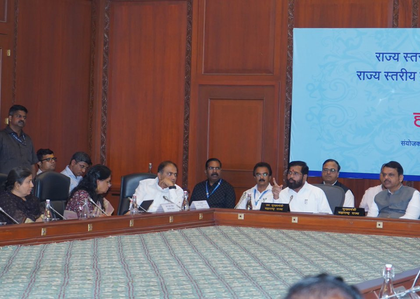Maha housing policy decisive in providing affordable, sustainable and inclusive housing to all: Deputy CM Shinde
By IANS | Updated: May 20, 2025 20:22 IST2025-05-20T20:16:46+5:302025-05-20T20:22:53+5:30
Mumbai, May 20 Maharashtra Deputy Chief Minister Eknath Shinde, who is also the Housing Minister, said on Tuesday ...

Maha housing policy decisive in providing affordable, sustainable and inclusive housing to all: Deputy CM Shinde
Mumbai, May 20 Maharashtra Deputy Chief Minister Eknath Shinde, who is also the Housing Minister, said on Tuesday that the path to affordable housing for the general and economically weaker sections of the state has been paved with the state's new housing policy which aims at My Home-My Right.
"This is a revolutionary policy and will give a new look to the state's urban development and housing. Moreover, with large-scale investment in this sector, Maharashtra's goal of a 1 trillion dollar economy will be greatly strengthened," he added.
Stating that this policy will be decisive in providing affordable, sustainable and inclusive housing to all sections, including the economically weaker sections, Deputy CM Shinde said that the state government has set a target of constructing 35 lakh houses for the economically weaker and low-income groups by 2030, and has taken special measures for each section keeping in mind the needs of the common man.
While explaining the important features of this policy, the Deputy Chief Minister said that it has considered the housing of senior citizens, employed women, students, industrial workers, journalists, differently-abled and ex-servicemen.
In this, the State Housing Information Portal will be created as a centralised digital platform using artificial intelligence.
Data on demand and supply of houses, geo-tagging of Sadanikas, fund distribution, district-wise land acquisition and coordination with systems like MahaRERA, Mahabhulekh and PM Gati Shakti will be achieved through this portal.
A bank of government lands suitable for residential use will be created.
This statewide land bank will be developed by 2026 in coordination with the Revenue and Forest Department, Maharashtra State Road Development Corporation, Maharashtra Industrial Development Corporation, Water Resources Department and other agencies, said Deputy CM Shinde.
"The Prime Minister has always advocated for housing close to work. In line with the concept of walk to work, this policy has laid emphasis on the development of housing close to employment centres, especially in industrial areas, he added.
It has also been decided to reserve 10 to 30 per cent of the 20 per cent land reserved for amenity plots in Maharashtra Industrial Development Corporation areas for residential use only, he said.
In view of increasing urbanisation, orders have been given to all Metropolitan Region Development Authorities, not only to large Municipal Corporations with a population of more than 10 lakh, for inclusive housing, he added.
He also said that Self-Redevelopment Cell, a dedicated self-redevelopment cell, is proposed to guide societies through planning, funding, developer selection and project implementation.
He also told that an initial fund of Rs 2,000 crore will be set aside for it.
He also said that as per the NITI Aayog recommendations on the G-Hub of Mumbai Metropolitan Region, the state government needs to make a significant portion of the estimated Rs 20,000 crore viability gap fund available through the Affordable Housing Fund to kick-start investment in the affordable and inclusive housing sector.
The policy is aimed at promoting green building practices, Deputy CM Shinde added.
Stating that the focus is on making cities greener by encouraging the integration of eco-friendly infrastructure, the Deputy Chief Minister said that new constructions will be planned to combat climate risks, including heat, floods and earthquakes, with innovative construction technologies under the Global Housing Technology Challenge for sustainable, disaster-resilient, cost-effective and climate-smart construction practices.
"All redevelopment projects must have a tripartite agreement between the society, developer and the authority, an Astro account for advance rent and bank guarantee for the protection of residents. Funds will be collected through CSR to support affordable and social housing projects. He also informed that Indian Institute of Technology, Indian Institute of Management Udaipur, World Resources Institute will be appointed as knowledge partners," he added.
Stating that the policy proposes to use the land of the Central government for slum rehabilitation projects, the Deputy Chief Minister said that the Central government and the Slum Rehabilitation Authority can jointly implement schemes for slum rehabilitation.
"Funds will also be taken from the concerned Central government department. This policy will be based on information technology to increase transparency, real-time monitoring and accountability in Slum Rehabilitation Authority projects. This will make it possible to identify beneficiaries, track the status of the project and manage funds," he added.
According to Deputy CM Shinde, the policy has encouraged cluster redevelopment as a strategic approach to revive slums.
New competent developers will be selected through a tender process in the stalled slum rehabilitation schemes, he said.
He reiterated that malpractices will be completely stopped by avoiding delays.
Meanwhile, Chief Minister Devendra Fadnavis said that the state government has released a dynamic housing policy after 2007 which expects an investment of Rs 70,000 crore in next five years.
"The Maharashtra government has announced a new housing policy, 'My Home, My Rights'. This policy has been formulated keeping in mind all types of housing needs in rural and urban areas. The closed housing schemes have also been included in it," he remarked.
Disclaimer: This post has been auto-published from an agency feed without any modifications to the text and has not been reviewed by an editor
Open in app